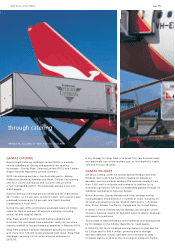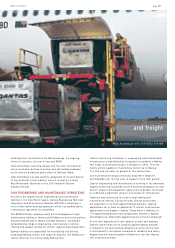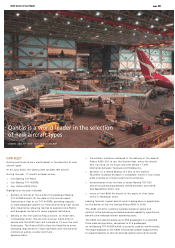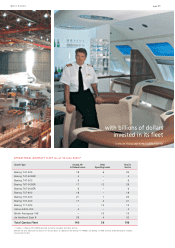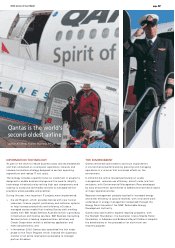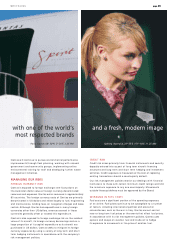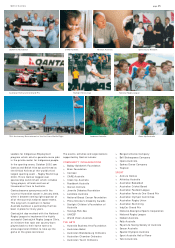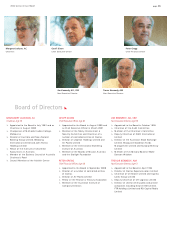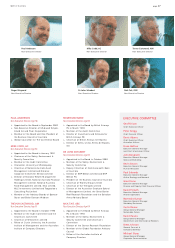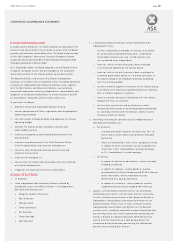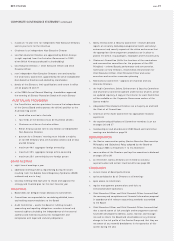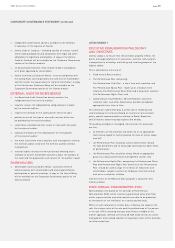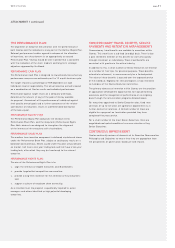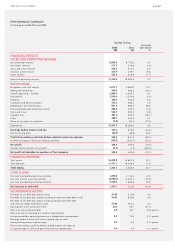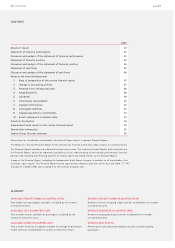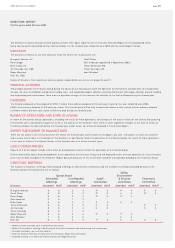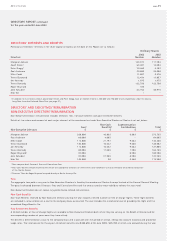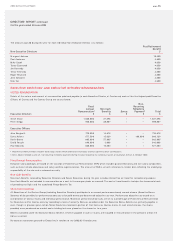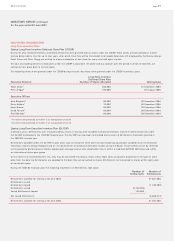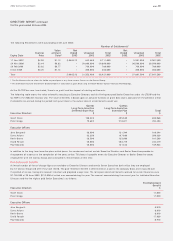Qantas 2003 Annual Report Download - page 30
Download and view the complete annual report
Please find page 30 of the 2003 Qantas annual report below. You can navigate through the pages in the report by either clicking on the pages listed below, or by using the keyword search tool below to find specific information within the annual report.
page 28
2003 Qantas Annual Report
CORPORATE GOVERNANCE STATEMENT
BOARD RESPONSIBILITIES
In preparing this Statement, the Qantas Board has focussed on the
structure and values which it has in place to ensure that the Board
protects and enhances shareholder value. The Board endorses each
of the ASX Corporate Governance Council’s Principles of Good
Corporate Governance and Best Practice Recommendations (ASX
Principles) published in M arch 2003.
On 1 September 2003, the Board adopted a formal Board Charter.
A copy of the Board Charter will be available on the Corporate
Governance section of the Qantas website (www.qantas.com).
The Board maintains, and ensures that Qantas management
maintains, the highest level of corporate ethics. The Board comprises
a majority of independent Non-Executive Directors who, together
with the BA Directors and Executive Directors, have extensive
commercial experience and bring independence, accountability and
judgment to the Board’s deliberations to ensure maximum benefit
to shareholders, employees and the wider community.
In particular, the Board:
promotes ethical and responsible decision-making
ensures compliance with laws, regulations and all appropriate
accounting standards
sets and reviews strategic direction and approves the annual
operating budget
oversees the Qantas Group, including its control and
accountability systems
monitors the operating and financial performance of the
Qantas Group
monitors the performance of the Chief Executive Officer,
Chief Financial Officer and executive management
ensures a clear relationship between performance and
executive remuneration
monitors risk management
ensures that the market and shareholders are fully informed
of material developments
recognises the legitimate interests of stakeholders
BOARD STRUCTURE
11 Directors
seven independent Non-Executive Directors elected by
shareholders other than British Airways – the independent
Non-Executive Directors are:
Margaret Jackson (Chairman)
Paul Anderson
Michael Codd
Trevor Eastwood
Jim Kennedy
Trevor Kennedy
John Schubert
a Qantas Non-Executive Director will be considered to be
independent if they:
are not a substantial shareholder of Qantas, or an officer
of, or otherwise associated directly with, a substantial
shareholder of Qantas (as such, the BA Directors are
not considered to be independent)
have not, within the last three years, been employed
in an executive capacity by the Qantas Group
have not, within the last three years, been a principal of
a material professional adviser or a material consultant to
the Qantas Group or an employee materially associated
with the service provided
are not a material supplier or customer of the Qantas Group,
or an officer of or otherwise associated directly or indirectly
with, a material supplier or customer
have no material contractual relationship with the Qantas
Group other than as a Director
are free from any interest and any business or other
relationship which could, or could reasonably be perceived
to, materially interfere with the Director’s ability to act in
the best interests of Qantas
materiality thresholds for determining the independence of
Non-Executive Directors are:
for Directors:
a relationship which accounts for more than 10% of
his/her gross income (other than Director’s Fees paid
by Qantas)
when the relationship is with a firm, company or entity,
in respect of which the Director (or any associate) has
more than a 20% shareholding if a private company
or 2% shareholding if a listed company
for Qantas:
in respect of advisers or consultants – where fees paid
exceed $2 million pa
in respect of suppliers – where goods or services
purchased by the Qantas Group exceed $100 million pa
(other than banks, where materiality must be
determined on a case by case basis)
in respect of customers – where goods or services
supplied by Qantas Group exceed $100 million pa
Qantas, as the principal Australian airline, has commercial
relationships with most, if not all, major entities in Australia.
As such, in determining whether a Non-Executive Director is
independent, simply being a non-executive director on the
board of another entity is not, in itself, sufficient to affect
independence. Nevertheless, any Director on the Board of
another entity is ordinarily expected to excuse themselves from
any meeting where that entity’s commercial relationship with
Qantas is directly or indirectly discussed. BA Directors must
consult with the Chairman on a case by case basis their
attendance during discussions concerning the relationship
between Qantas and British Airways


